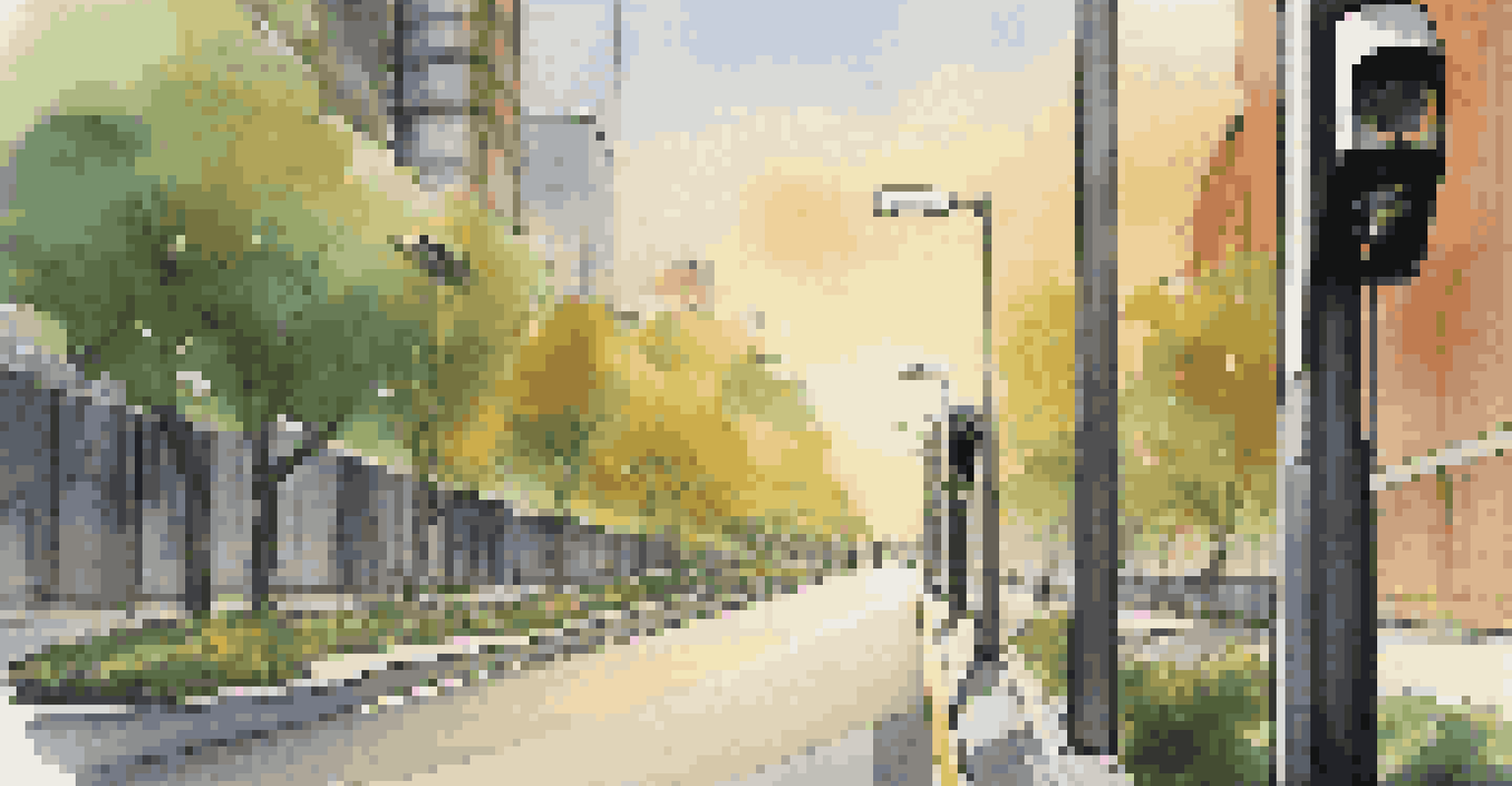Smart Cities and Urban Planning: Careers in Tech Innovations

Understanding Smart Cities and Their Importance
Smart cities are urban areas that leverage technology to enhance performance, efficiency, and livability. Imagine a city where traffic signals adjust in real-time based on traffic flow, or where waste management systems optimize routes for garbage trucks. These innovations not only improve daily life but also contribute to sustainability efforts, making cities more resilient to challenges like climate change.
Smart cities are not just about technology. They are about how technology can improve the quality of life for everyone in the city.
The significance of smart cities lies in their ability to address urban challenges such as overcrowding, pollution, and resource management. For instance, sensors can monitor air quality, providing data that helps city planners make informed decisions. As urban populations continue to grow, the need for intelligent solutions becomes increasingly crucial.
In this context, technology plays a vital role in transforming traditional urban planning. By integrating data and digital tools, city planners can create environments that are not only functional but also enjoyable for residents. This evolution opens up exciting career opportunities in various tech-related fields.
Career Paths in Smart City Technology
The rise of smart cities has created a diverse array of career paths for tech enthusiasts. From software developers to urban data analysts, the demand for skilled professionals is on the rise. For example, urban data analysts use data analytics to interpret trends and help plan smarter cities, while software developers create applications that make urban life more efficient.

Additionally, project managers in the smart city space coordinate between various stakeholders, ensuring that projects align with community needs and technological capabilities. These roles not only require technical skills but also a strong understanding of urban planning principles and community engagement.
Smart Cities Enhance Urban Living
By leveraging technology, smart cities improve efficiency, sustainability, and the overall quality of life for residents.
Moreover, there's a growing emphasis on interdisciplinary collaboration. Those interested in environmental science, architecture, and public policy can find their skills relevant in the smart city ecosystem. This convergence of disciplines fosters innovation and leads to more holistic urban development solutions.
The Role of Data in Urban Planning
Data is the backbone of smart city initiatives, driving decisions that impact urban living. By collecting data on traffic patterns, energy usage, and public health, city planners can identify areas needing improvement. For instance, analyzing traffic data can lead to optimized public transportation routes, reducing congestion and carbon emissions.
The city is not a mere collection of buildings and streets; it is a complex ecosystem that thrives on the interplay of technology, community, and design.
In addition, citizen engagement platforms allow residents to share their experiences and feedback. This crowdsourced data helps planners align city services with the actual needs of the community. It's a powerful reminder that urban environments should prioritize the voices of their residents.
As technology continues to evolve, the tools for data collection and analysis will only become more sophisticated. This presents an exciting opportunity for those in tech to innovate and contribute to a more connected and responsive urban landscape.
Emerging Technologies Shaping Smart Cities
Emerging technologies such as IoT (Internet of Things), AI (Artificial Intelligence), and blockchain are revolutionizing urban planning. IoT devices, like smart meters and sensors, collect real-time data, enhancing the functionality of city services. For example, smart streetlights can adjust their brightness based on pedestrian movement, saving energy and improving safety.
Artificial intelligence plays a crucial role in analyzing this data, helping city officials predict trends and make proactive decisions. Imagine AI algorithms that can forecast traffic jams before they happen, allowing for timely interventions. This is where tech careers can thrive, as professionals develop solutions that make cities smarter.
Diverse Careers in Urban Tech
The rise of smart cities creates a variety of career opportunities in fields such as data analysis, urban planning, and project management.
Blockchain technology also introduces transparency and security in urban management. For instance, it can ensure that public records are tamper-proof and accessible. As these technologies evolve, they create new job opportunities for those interested in their development and implementation.
Sustainability and Smart Cities
Sustainability is at the heart of many smart city initiatives, aiming to create eco-friendly urban environments. Smart energy grids allow for efficient energy distribution, reducing waste and lowering carbon footprints. Similarly, green building technologies promote sustainable construction practices, making buildings more energy-efficient.
Moreover, smart waste management systems optimize collection routes and reduce landfill usage, contributing to cleaner cities. By integrating these sustainable technologies, urban planners can create healthier living conditions for residents. This not only addresses environmental concerns but also enhances the overall quality of life.
As sustainability becomes increasingly important, careers focused on green technology and urban sustainability are on the rise. Professionals in this field have the chance to make a meaningful impact, designing cities that prioritize both people and the planet.
Collaboration in Smart City Development
Creating a smart city is not a solo endeavor; it requires collaboration among various stakeholders. Governments, tech companies, and community organizations must work together to ensure that urban innovations meet the needs of all citizens. This collaborative approach fosters a sense of ownership and encourages community participation in the planning process.
Public-private partnerships are particularly vital, allowing for the sharing of resources and expertise. For instance, a tech company may provide the technology for smart traffic management, while the city government ensures that it aligns with local regulations and community goals. This synergy leads to more effective and inclusive urban solutions.
Collaboration Drives Success
Successful smart city initiatives rely on collaboration among governments, tech companies, and communities to meet the needs of all citizens.
As collaboration becomes more essential, there are growing career opportunities in project management and strategic planning. Professionals who can navigate the complexities of partnerships will be invaluable in driving successful smart city initiatives.
Future Trends in Smart City Careers
The future of smart cities promises exciting career trends for tech innovators. As cities evolve, the demand for professionals skilled in data analysis, cybersecurity, and urban technology will continue to grow. These roles will be crucial in ensuring that smart city initiatives are not only effective but also secure against potential threats.
Additionally, as public awareness of smart city benefits increases, there will be greater emphasis on community-centered design. Careers focused on user experience and community engagement will become more prominent, as cities strive to create solutions that truly resonate with residents.

Ultimately, the intersection of technology and urban planning will offer a wealth of opportunities for those passionate about making a difference. By embracing these trends, aspiring professionals can play a vital role in shaping the future of urban living.